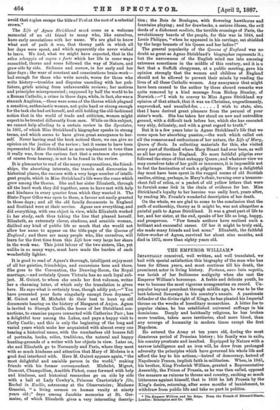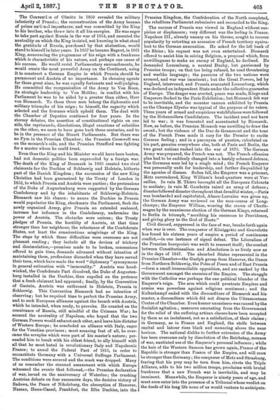THE EMPEROR "WILLIAM.*
Leseamuur conceived, well written, and well translated, we hail with special satisfaction this biography of the man who has been for fifteen years, and must continue till his death, the prominent actor in living history. Fortuna, scam beta negotio, was lavish of her frolicsome malignity when she cast the Emperor William's horoscope. A feeble and delicate youth, he was to become the most vigorous nonagenarian on record. Un- popular beyond precedent through middle age, he was to be the best-beloved Sovereign in his country's annals. A passionate defender of the divine right of Kings, he has planted his Imperial throne on the wrecks of hereditary monarchies. A bitter foe to popular claims, he has established universal suffrage in his dominions. Deeply and habitually religions, he has broken more treaties, taken more territories, shed more blood, than any scourge of humanity in modern times except the first Napoleon.
He entered the Army at ten years old, during the most disastrous period of Prussian history ; his family was in exile, his country prostrate and insulted. Equipped by Nature with a narrow intelligence and an iron will, he drew from prolonged adversity the principles which have governed his whole life and afford the key to his actions,—hatred of democracy, hatred of Napoleonic France, implicit faith in militarism. When, in 1845„ his brother, King Frederick William, granted a Representative Assembly, the Prince of Prussia, as he was then called, opposed the measure as ruinous to throne and country, exciting so much bitterness against himself, that in 1848 he left Prussia by the King's desire, returning, after some months of banishment, to withdraw from public life and take no part in politics.
EmPror nnd hir Feign. From the French of Edouard Simon,, London: Remington and 0o. IMO.
The Conventim of Olinfitz in 1850 revealed the military inferiority of Prassit ; the reconstruction of the Army became of prime uatisnal importance, and was committed by the King to his brother, who threw into it all his energies. He was eager to take part against Russia in the war of 1854, and resented the neutrality on which the King insisted, not knowing in what stead the gratitude of Bassin, purchased by that abstention, would :stand to himself in later years. In 1857 he became Regent, in 1861 King, announcing the programme of his reign with a frankness which is characteristic of his nature, and perhaps one cause of his success. He would resist Parliamentary encroachments, he would create the most powerful Army on the Continent, using it to construct a German Empire in which Prussia should be paramount and Austria of no importance. In choosing agents for these great aims, he was equally fortunate and well-judging. He committed the reorganisation of the Army to Von Roon, its strategic leadership to Von Moltke; in conflict with his Parliament he was to be aided by a greater than either, Herr von Bismarck. To these three men belong the diplomatic and military triumphs of his reign ; to himself, the sagacity which selected and the firmness which upheld them. The duel with the Chamber of Deputies continued for four years. In the stormy debates, the assertion of constitutional rights on one side, the reprimands, dissolutions, illegal exactions of subsidies on the other, we seem to have gone back three centuries, and to be in the presence of the Stuart Parliaments. But there was no Pym in the Prussian Chamber; the Prussian Cromwell was on the monarch's side, and the Prussian Strafford was fighting for a master whom he could trust.
Even thus the King and his Minister would have been beaten, had not domestic politics been superseded by a foreign war. The death of the King of Denmark in 1863 created two rival claimants for the Duchies of Schleswig and Holstein, hitherto part of the Danish Kingdom ; the succession of the new King Christian had been guaranteed by the Treaty of London in 1852, to which Prussia and Austria were parties ; the pretensions of the Duke of Augustenburg were supported by the German Confederacy and by the inhabitants of Schleswig-Holstein. Bismarck saw his chance : to annex the Duchies to Prussia would popularise the King, checkmate the Parliament, flesh the newly organised Army, give Prussia an extended seaboard, increase her influence in the Confederacy, undermine the power of Austria. The obstacles were serious; the Treaty pledges of Prussia, the hostility of Austria, at that time stronger than her neighbour, the reluctance of the Confederate States, not least the conscientious misgivings of the King. The steps by which these difficulties were overcome are not pleasant reading ; they include all the devices of trickery and dissimulation,—promises made to be broken, concessions offered to gain time, demands advanced without intention of maintaining them, professions discarded when they have served their turn, which have made the word " diplomacy " synonymous in general estimation with "immorality." Austria was hood- winked, the Confederate Pact dissolved, the Duke of Augusten- burg installed in the Duchies, then expelled on the pretence that a fresh claimant had appeared ; finally, by the Convention of Gasteiu, Austria was enthroned in Holstein, Prussia in Schleswig. This Convention Bismarck had no intention of observing ; but he required time to perfect the Prussian Army, and to seek European alliances against the breach with Austria, which he intended, when ready, to provoke. He counted on the connivance of Russia, still mindful of the Crimean War ; he secured the neutrality of Napoleon, who hoped that the two German Powers would exhaust each other, and leave him dictator of Western Europe; he concluded an alliance with Italy, eager for the Venetian provinces ; most amazing feat of all, he over- came the scruples which were part of his master's nature ; per- suaded him to break with his oldest friend, to ally himself with all that he most hated in revolutionary Italy and Napoleonic Prance; to annul the Federal Pact of 1815, in order to reconstitute Germany with a Universal Suffrage Parliament. The conditions were secured and the mask was dropped. Many of us remember the stunned amazement with which Europe witnessed the events that followed,—the Prussian declaration of war, issued on the anniversary of Waterloo ; the crashing Austrian defeats on four successive days, the decisive victory of Sadowa, the Peace of Nikolsburg, the absorption of Hanover, Nassau, Hesse-Cassel, Frankfort, the Elbe Duchies, into the Prussian Kingdom, the Confederation of the North completed, the rebellious Parliament submissive and reconciled to the King.
The success of Prussia was viewed in England without ens. pinion or displeasure ; very different was the feeling in France. Napoleon III., already uneasy on his throne, sought to recover popularity by extorting an accession of French territory equiva- lent to the German annexation. He asked for the left bank of the Rhine ; his request was not even entertained. Bismarck offered to assist him in seizing Belgium, a proposal which, from unwillingness to make an enemy of England, he declined. Be demanded Luxemburg, a neutral Duchy, but garrisoned by Prussian troops ; on that too being refused, he used threatening and warlike language ; the passions of the two nations were aroused, and war was imminent ; but the Great Powers, led by England, intervened, and Prussia evacuated Luxemburg, which was declared an independent State under the collective guarantee of Europe. The danger was averted, peace was made, Kings and Emperors flocked to the Paris Exhibition ; but Bismarck felt war to be inevitable, and the monster cannon exhibited by Prussia on the Champs Elys6es was typical of the purpose of its rulers. Three years of armed and suspicious watchfulness were followed by the Hohenzollern Candidature. The incident need not have led to war ; it was fomented and accentuated by Bismarck. Now, as before, the Prussian Monarch was unwilling to draw the sword ; but the violence of the Due de Grammont and the tone of the French Press made it easy for the Premier to excite German feeling ; and in a paroxysm of passion, calculated on his part, genuine everywhere else, both at Paris and Berlin, the two great nations rushed into the war of 1870. The German Army was prepared, the French was not. The French offensive plan had to be suddenly changed into a hastily schemed defence. The Germans were led by a single mind ; the French Emperor was personally unfit for leadership, and further disqualified by the agonies of disease. Sedan fell, the Emperor was a prisoner, Metz surrendered, King William's head-quarters were at Ver- sailles. In vain M. There besought all the European Cabinets to mediate; in vain M. Gambetta raised an army of defence ; disasterfollowed disaster throughout that dreadful winter,—Paris was bombarded and capitulated, Alsace-Lorraine was given up, the German Army was reviewed on the race-course of Long- champs ; the Emperor William, wearing the crown of Charle- magne by the unanimous election of the German Kings, returned to Berlin in triumph, "ascribing his successes to Providence, and giving glory to the God of Hosts."
Civil discord, suppressed in the face of war, breaks forth again when war is over. The conqueror of Koniggriitz and Gravelotte has found his sixteen years of empire a period of continuous conflict,—in one instance of signal defeat. The Liberalism of the Prussian bourgeoisie was swift to reassert itself ; the combat between Constitutionalism and Absolutism is as lively now as in the days of 1847. The absorbed States represented in the Prussian Chamber—the Guelph group from Hanover, the Danes from Northern Schleswig, the Poles of Posen and of East Prussia —form a small irreconcilable opposition, and are ranked by the Government amongst the enemies of the Empire. The struggle with the Catholics was perhaps the one political blunder of the Emperor's reign. The arm which could prostrate Empires and armies was powerless against religious sentiment ; and the Kulturkampf ended with the discomfiture of Bismarck and his master, a discomfiture which did not disarm the Ultramontane Centre of the Chamber. Even keener uneasiness was caused by the Socialist agitation ; measures emanating from the Government for the relief of the suffering artisan classes have been accepted by them as an instalment, not as a satisfaction, of their claims ; in Germany, as in France and England, the strife between capital and labour rises black and menacing above the near horizon. The national dislike to farther extension of the Army has been overcome only by dissolution of the Reichstag, menace of war, unstinted use of the Emperor's personal influence ; while the hair of the Western Samson has grown again, France of the Republic is stronger than France of the Empire, and will soon be stronger than Germany ; the conqueror of Metz and Strasburg, fearing that his prey may be torn from him, rivets the Triple Alliance, adds to his two million troops, proclaims with brutal frankness that a new French war is inevitable, and may be imminent. Meanwhile, the Emperor is ninety years of age, and must soon enter into the presence of a Tribunal whose verdict on the deeds of his long life none of us would venture to anticipate.



































 Previous page
Previous page